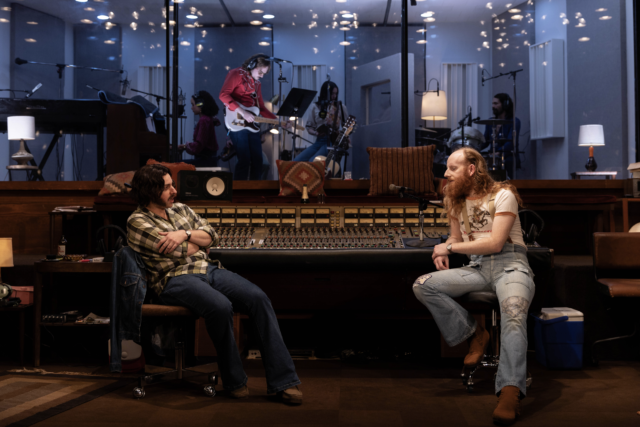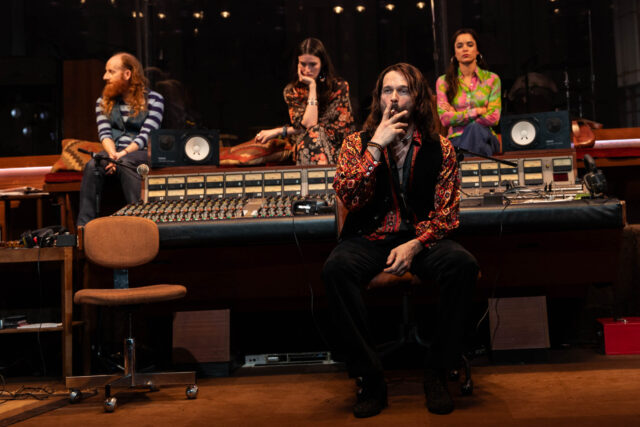
Engineers Grover (Eli Gelb) and Charlie (Andrew R. Butler) chew the fat as the band readies to record in David Adjmi’s Stereophonic (photo by Chelcie Parry)
STEREOPHONIC
Playwrights Horizons, Mainstage Theater
416 West 42nd St. between Ninth & Tenth Aves.
Through December 17, sold out
www.playwrightshorizons.org
In many ways, the creation of David Adjmi’s Stereophonic mimics the record that the fictional band is making in the play. Following such well-received works as Elective Affinities, Stunning, The Evildoers, and Marie Antoinette, Adjmi announced to friends and colleagues in 2013 that he was leaving the theater, but he immediately started receiving offers of grants and residencies. A three-year residency at Soho Rep resulted in what would become the widely hailed Stereophonic, which went from a seventy-minute play to a two-act, then three-act, and ultimately four-act, three-hour epic whose premiere was delayed because of the pandemic.
In the play, a successful, unnamed rock band suddenly has an eighteen-month-old song called “Dark Night” rising on the charts and are working on a new one, titled “Bright,” echoing the up-and-down nature of personal and professional partnerships. The band is in a Sausalito recording studio in the summer of 1976 for what was expected to be quick, low-budget sessions that start turning into much more.
The band consists of British bass player Reg (Will Brill), British keyboard player and singer Holly (Juliana Canfield), British drummer Simon (Chris Stack), American guitarist and lead singer Peter (Tom Pecinka), and American singer and tambourine player Diana (Sarah Pidgeon). Reg is getting lost in a haze of booze and coke; Simon, who also serves as manager, is having trouble keeping the beat; Holly, who is married to Reg, is reevaluating her living situation; and the controlling Peter is jealous of his girlfriend, Diana, as she brings another potential hit to the group.
Grover (Eli Gelb), who lied on his resume to get the gig, is the recording engineer, assisted by Charlie (Andrew R. Butler); while Grover, a stoner, is nervous and fidgety, worried that he is in over his head, especially when the discord within the band grows, Charlie is gentle and quiet, preferring to remain in the background, their relationship somewhat recalling that between Jay and Silent Bob in Kevin Smith’s films.

Band and crew members take a much-needed break in three-hour Stereophonic (photo by Chelcie Parry)
The show unfolds like a cool double, or even triple, LP. Not every play scene / LP song works, but the cast/band are uniformly excellent, as are the engineers/crew (with studio set by David Zinn, costumes by Enver Chakartash, lighting by Jiyoun Chang, sound by Ryan Rumery, and music direction by Justin Craig). The songs, by former Arcade Fire multi-instrumentalist and Grammy winner Will Butler, capture the essence of 1970s California rock as the angst increases among the members of the band and they attempt to balance professional and personal success. Director Daniel Aukin helms the play like a star album producer.
Sure, it’s too long at three hours in four parts, the equivalent of a quadruple album. At one point, concerned about the length of the record they’re making and one song in particular, Peter says, “We can’t fit everything. I know no one wants to cut anything and we’ve talked a whole lot about continuity. But I’m sorry. We need to have this conversation. We need to decide what we’re gonna do; we’re four minutes over and it’s not enough for a double album. . . . We need to cut stuff.” Reg asks, “Why can’t we do a double album?”
Younger audience members might not know that on cassettes and LPs, artists were limited to 22.5 minutes per side, and sometimes the songs on the cassette were in a different order than on the record, resulting in a loss of continuity. In addition, listeners had to flip the cassette or album to hear the other side; musicians couldn’t just make an album of any length that could stream online endlessly, complete with the ability to easily skip over songs they might not like.
You can’t do that in the theater. Thus, Stereophonic contains some fluff, repetition, and scenes that don’t seem to fit with the others, but for the most part it’s a fun and poignant behind-the-scenes look at artistic creation, collaboration, ego, and jealousy. We’re all the better with Adjmi deciding not to quit the band/theater; I’m looking forward to the several plays he has coming up, including an exploration, with Lila Neugebauer, of the making of Brian Wilson’s Smile album.
[Mark Rifkin is a Brooklyn-born, Manhattan-based writer and editor; you can follow him on Substack here.]